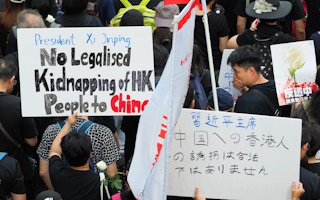There has been an alarming trend of Asian governments committing acts of transnational repression to silence their critics living on foreign soil, according to international non-governmental organisation Human Rights Watch.
To continue reading, subscribe to Eco‑Business.
There's something for everyone. We offer a range of subscription plans.
- Access our stories and receive our Insights Weekly newsletter with the free EB Member plan.
- Unlock unlimited access to our content and archive with EB Circle.
- Publish your content with EB Premium.
While this is a longstanding issue, increased communications, travel and new technologies have enabled governments to carry out human rights abuses against their nationals living abroad, said the human rights watchdog in its 2024 world report. This repression has targeted minority communities and government critics, taking the form of arbitrary deportations, abductions and killings.
“This is a very worrying trend,” said Elaine Pearson, Asia director at Human Rights Watch at a press conference last Friday. “If governments aren’t held to account for serious abuses that occur in their own countries, then they become bolder – given our interconnected digital world, they’ve tried to silence criticism beyond borders.”
In China, there has been “increased social control and increased repression” under more than a decade of president Xi Jinping’s leadership, said Pearson. Its human rights infringements have not been limited by its borders: pro-democracy activists at Western universities have faced harassment, surveillance, and intimidation for speaking up about Chinese government abuses in Hong Kong, Tibet, or Xinjiang, the report said.
Some Southeast Asian countries have been complicit in China’s repression of its activists. In Laos last year, exiled journalist Yang Ze Wei was kidnapped from his home and human rights lawyer Lu Siwei detained en route to Thailand. Both have reappeared in detention in China.
Thailand also has a history of repatriating Chinese Uyghurs, an ethnic and predominantly Muslim minority, to China. Phil Robertson, deputy director for Asia at Human Rights Watch, said that he and his colleagues have not been able to track what happened to 109 Uyghur detainees who were repatriated to China from Thailand in 2015. Some 50 Uyghurs and Rohingya refugees from Myanmar continue to be detained in Thailand, where several have died of health problems.
In other countries such as Malaysia, there has been pressure from China to comply with its demands to return political critics in “clear instances of transnational repression,” said Robertson. “China is extremely aggressive and actively pursuing a policy of transnational repression against people who are activists, dissidents and ethnic minorities who face persecution and have fled the country and tried to get to a safe place,” he said. “It is something the international community has to do something about.”
Meanwhile, journalists from Southeast Asia have only been able to access sites in Xinjiang that have been curated by the Chinese Communist Party, said Pearson. “They didn’t get to visit the political reeducation camps or speak to individuals apart from those who were handpicked by the Chinese government.”
The cost of transactional diplomacy
China is not the only Asian country that repressed its overseas critics last year. Human Rights Watch in its report noted that India also attempted to silence its critics in other countries, with authorities blocking several Canadian users of social media platform X which had been critical of the Indian government. More recently, Indian officials were said to have been involved in the assassination of Sikh activist in Canada in September. Another Sikh activist in the US was also the target of an assassination attempt last month.
Southeast Asian governments have also been complicit in the repatriation of asylum seekers to neighbouring home countries, where they face detention and continued persecution. For example, Vietnamese refugee Thai Van Duong was abducted in Bangkok last year and forced back to Vietnam, where he is now in jail, Pearson pointed out.
In Malaysia last year, hundreds of Myanmar nationals were deported from Malaysia without the opportunity to file asylum claims. Thuzar Maung, a refugee activist from Myanmar and her entire family were abducted in July, Pearson pointed out. The family is still missing.
Many of these human rights abuses have gone unchecked by Western governments which are more preoccupied with limiting the political threat posed by China, said Pearson. “We’ve seen little appetite to hold human rights abuses responsible if those abuses are seen as strategic allies or trade partners in derisking, decoupling, or helpful in otherwise containing the rise of China in Asia,” she said.
Human Rights Watch executive director Tirana Hassan described this phenomenon as “selective government outrage and transactional diplomacy.”
“When governments pick and choose which obligations to enforce, they perpetuate injustice not only in the present but in the future for those whose rights have been sacrificed,” she wrote in the report. Worryingly, this could embolden abusive governments to extend the reach of their repression.
Fortunately, the private sector and civil society can act in ways that delegitimise state-sponsored human rights abuses. “One bit of bright news we’ve had is that just last week, US company Thermo Fisher has stopped supplying its DNA technology to Tibetan police,” said Pearson. The move came after Human Rights Watch exposed the collection of DNA from Tibetans without their consent.
“We would like to see the same approach applied across China, because these abuses are not just happening in Tibet,” said Pearson.
Another positive takeaway is that despite the very real risks of imprisonment, harassment and intimidation, human rights defenders and civil society organisations are pushing back against oppressive regimes.
“What we want to see is better coordination between different countries to get effective change,” said Pearson. “It’s no longer possible to rely on a handful of powerful countries to push for change. We want to see a coalition of governments around the world working together to push for positive change.”










